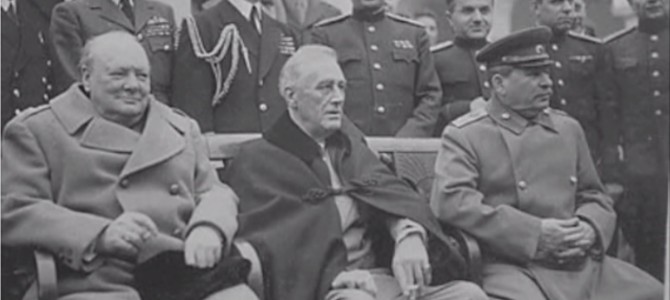
In the fourth lecture of Hillsdale College’s free online Winston Churchill and Statesmanship course (which you can take along with me here), college President Larry Arnn outlines the aspects of modern life that worried the former prime minister.
While ancient philosophers spent time contemplating what the ideal society would look like, modern thinkers tossed much of this speculation aside to embrace a more pragmatic approach. This tactic troubled Churchill. He worried that modern men would lose sight of “the good,” and forget what it means to thrive.
In his 1925 essay, “Mass Effects In Modern Life,” Churchill wrote the disappearance of the local business and rise of a corporate culture meant men were governed by a larger, more distant ecosystem or organizational structure. As interactions between industries, businesses, and consumers became more and more faceless, Churchill was concerned that heightened consequences would cause people to lose sight of “the little platoon.”
Churchill Thought Socialism Was Antithetical to Liberty
In 1945 — just a month after the Germans surrendered, bringing World War II to a close — Churchill spoke against socialism and the rise of the Labor Party’s presence in Parliament at the time. In a radio broadcast, he said socialism is antithetical to the British concept of freedom, as it requires a police force, a large bureaucracy, and limitations on free speech to prop up the state.
I declare to you, from the bottom of my heart, that no Socialist system can be established without a political police…No Socialist Government conducting the entire life and industry of the country could afford to allow free, sharp, or violently-worded expressions of public discontent. They would have to fall back on some form of Gestapo, no doubt very humanely directed in the first instance.
After delivering this speech, Churchill sent a message to President Harry Truman, warning him that the United States’ decision to leave socialists alone was a mistake. He predicted that socialism would rise across Europe and threaten the existence of freedom in the West. Churchill lost the 1945 election, and the Labor Party won a majority of seats in Parliament that year, which led many to dub the aforementioned address “The Crazy Speech.” But this pushback didn’t change his mind or stop him from continuing to speak out against socialism.
Tech Advancements Complicate Ethical Questions
In an essay entitled “Fifty Years Hence,” Churchill said that in the next 50 years, science would meddle in the regular affairs of men and alter humanity. He predicted human beings could be developed in a lab, and worried this would lead to humans being manufactured with diminished mental capacities whose only purpose was to work, not to think.
He anticipated that men would be able to travel to other planets and create immense pleasures and eliminate discomfort. But that none of these amenities, he said, would answer the nagging questions that have persisted in the minds of men since the dawn of time. Science and material comforts cannot tell us why we are alive, for this answer transcends this earth and this galaxy.
In the end a race of beings was evolved which had mastered nature. A state was created whose citizens lived as long as they chose, enjoyed pleasures and sympathies incomparably wider than our own, navigated the inter-planetary spaces, could recall the panorama of the past and foresee the future. But what was the good of all that to them? What did they know more than we know about the answers to the simple questions which man has asked since the earliest dawn of reason-‘Why are we here? What is the purpose of life? Whither are we going?’ No material progress, even though it takes shapes we cannot now conceive, or however it may expand the faculties of man, can bring comfort to his soul. It is this fact, more wonderful than any that Science can reveal, which gives the best hope that all will be well. Projects undreamed of by past generations will absorb our immediate descendants; forces terrific and devastating will be in their hands; comforts, activities, amenities, pleasures will crowd upon them, but their hearts will ache, their lives will be barren, if they have not a vision above material things. And with the hopes and powers will come dangers out of all proportion to the growth of man’s intellect, to the strength of his character or to the efficacy of his institutions. Once more the choice is offered between Blessing and Cursing. Never was the answer that will be given harder to foretell.
With technological advancements, he predicted that ethical questions would become all the more complicated. He insisted that men have and always will want to know their purpose and lead fulfilling lives. Thus, he said, ancient ideals should not be cast aside, for doing so would welcome the collapse of men.









